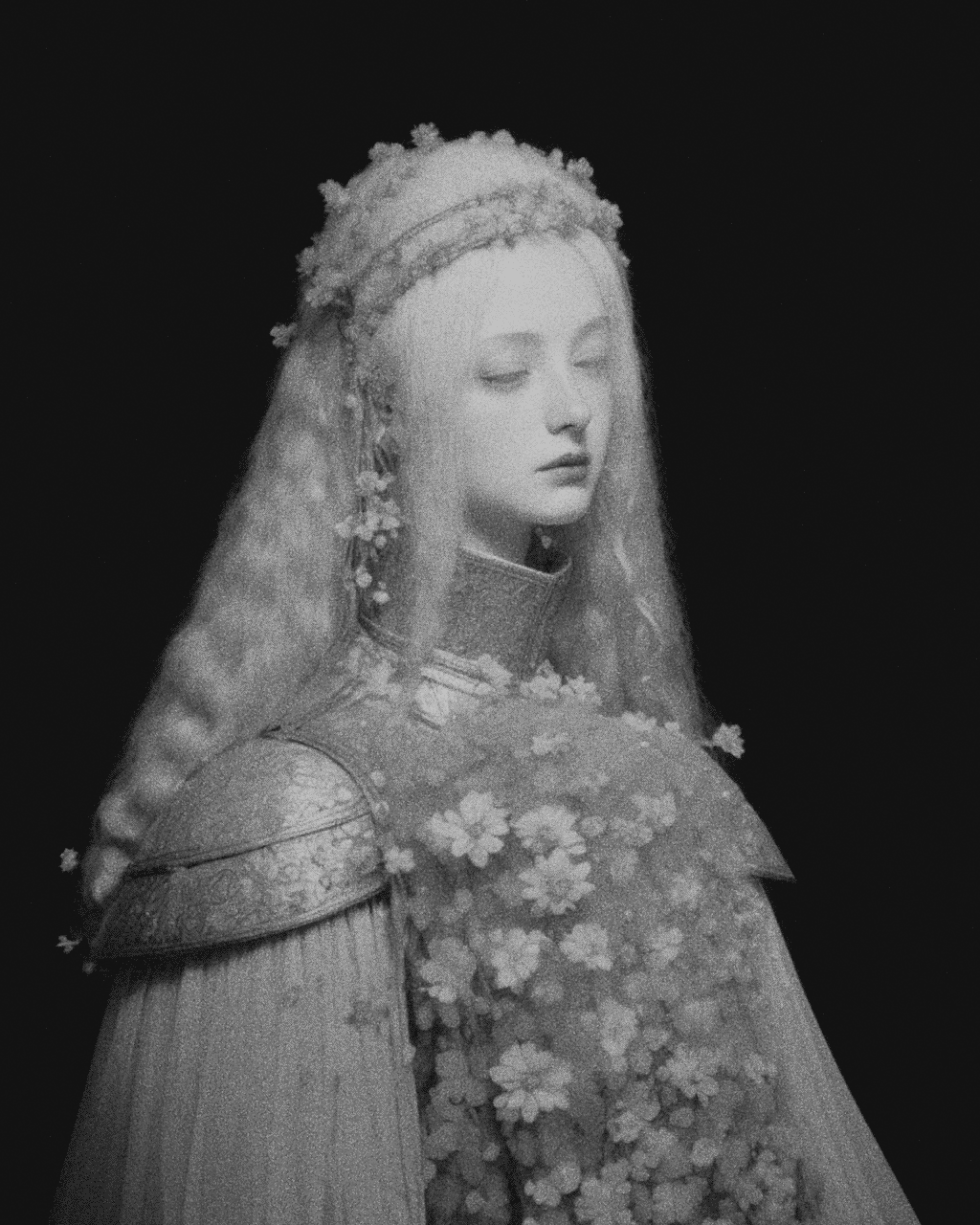🎁 A special gift for readers: Scroll down to download the wallpaper version of this artwork.
The Iron Garden
The quiet came first, always.
It settled in the hollow spaces between her ribs like morning mist, thick and deliberate. Then the weight — the familiar press of steel against collarbone, the slow ache in her shoulders where the pauldrons had learned the exact curve of her bones. She had forgotten what it meant to breathe without the armor’s permission.
But this morning was different. This morning, something stirred.
Mira opened her eyes to find the world unchanged: the same grey walls, the same shaft of pale light cutting through the chamber’s perpetual dusk. Her reflection in the polished steel remained constant — white hair spilling like winter over shoulders that had not moved in months. Yet something had shifted in the night, something that made the silence feel less absolute.
A petal.
It rested against her breastplate like a whisper made manifest, translucent and trembling with each shallow breath. She had not noticed it before, though she suspected it had been growing slowly, patiently, the way grief learns to bloom in the most barren soil.
The flower was impossibly delicate — a thing that belonged in summer meadows, not in the sepulchral quiet of her self-imposed exile. Its stem disappeared into a hairline crack where two plates met, as if the armor itself had learned to dream. She could not name its species, could not recall ever seeing its like in the palace gardens of her youth. It was something entirely new, or perhaps something entirely forgotten.
Mira closed her eyes and let memory wash over her.
The field hospital. Rain drumming against canvas walls. His hand, steady despite the tremor of shock, guiding hers as she learned to tie sutures. “The body wants to heal,” he had said, his voice gentle in the chaos. “Sometimes we just need to show it how.”
When she looked again, the petal had shifted, catching the light differently. For a heartbeat, she could swear she smelled earth after rainfall, the ghost of antiseptic and unwashed wool, the phantom scent of hope in desperate places.
The armor had been her penance, accepted willingly in the war’s dying days. Each piece forged from the weapons of fallen enemies, quenched in tears she could not shed, blessed by priests who understood that some victories require their own form of sacrifice. It was meant to be temporary — a ritual of mourning, a way to carry the weight of survival when living felt like betrayal.
But steel has its own memory, its own patience. It had learned the rhythm of her heart, had grown familiar with the salt of her tears. It had become less like clothing and more like skin, less like burden and more like breath. Removing it now would be like asking a tree to shed its bark, asking winter to forget the taste of snow.
Another petal unfurled near her throat, where the gorget pressed closest to her pulse. This one was darker, veined with silver, and it moved with her swallow as if it were part of her. She wondered if this was how gardens began — not with seeds scattered by wind, but with sorrow so deep it demanded its own spring.
In the growing light, she could see them now: dozens of tiny buds working their way through joints and seams, following the armor’s contours like living embroidery. They were beautiful in the way that elegy is beautiful, the way that acceptance can sometimes look like art.
She tried to remember when she had last spoken aloud, when she had last felt the need for words. The flowers seemed to pulse gently, as if responding to her silence, as if they had become the language she could not speak. Each bloom was a name, a face, a moment she had failed to save. They were her apology and her absolution, growing in the space where guilt and love had learned to share the same soil.
Time moved differently in the garden of her armor. Minutes could be years, years could be heartbeats. She had learned to measure seasons not by the sun’s movement but by the slow evolution of her strange burden, the way the metal grew warm under her hand, the way the flowers taught her that even endings could learn to begin again.
Somewhere in the castle, bells marked the passage of hours she no longer counted. Somewhere beyond these walls, the world continued its ancient dance of breaking and mending, of losing and finding, of forgetting and being forgotten.
But here, in the quiet country of her stillness, Mira tended her iron garden and waited for the day when the last petal would unfurl, when the final name would bloom, when the armor would finally remember how to let go.
Until then, she would be what she had always been: the keeper of small resurrections, the gardener of necessary griefs, the one who knew that sometimes the most beautiful things grow in the darkest soil of the human heart.
The flower at her throat pulsed once, gentle as a lullaby, and Mira closed her eyes and let the quiet carry her toward whatever came next.






No comments
Post a Comment